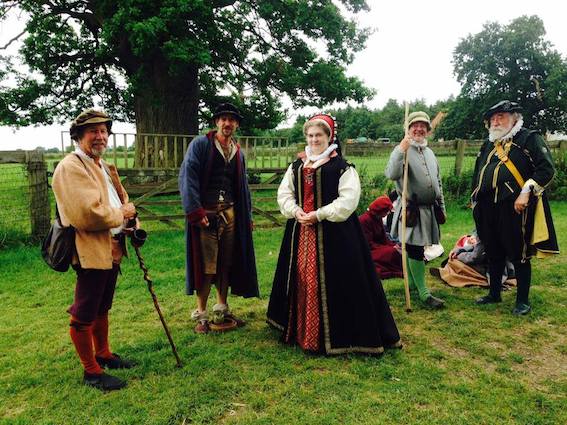• Not just a house but an entire community
 Kentwell's Tudor Re-Creations are the biggest and most comprehensive anywhere in the UK. They re-create an entire Tudor community. The extensive Kentwell grounds cover over 25 acres, based around our early 16th Century moated Tudor Manor House. Children can meet up to 250 Tudors and have the opportunity to see over 40 aspects of Tudor life.
Kentwell's Tudor Re-Creations are the biggest and most comprehensive anywhere in the UK. They re-create an entire Tudor community. The extensive Kentwell grounds cover over 25 acres, based around our early 16th Century moated Tudor Manor House. Children can meet up to 250 Tudors and have the opportunity to see over 40 aspects of Tudor life.
A Tudor Manor such as Kentwell, and its inhabitants, the Clopton Family, would not have been able to live in such comfort without an army of retainers and labourers whose lives they were intimately dependent on.
This community is wide ranging. Almost all were skilled in one craft or another, be it cooking delicacies, crafting wood, working in the forge or tending animals. Only the poorest were unskilled labourers, but their work was just as vital.
A lesson in life
A visit to a Kentwell Tudor Recreation is a lesson in life.
One visiting teacher said:
"A visit to Kentwell should be compulsory for every child. It's an essential part of every child's education."
By this she meant that it gives a great lesson in what it means to be alive, to live in a community, and to be connected with those around you and the land you live on.
In Tudor England the rich cannot ignore the poor, who are waiting at their table and bringing them wood to burn, or cloth they have woven to wear. Communities had no choice but to look after their elderly, ill and young. Life was far more immediate, people were intimately connected to the land and went hungry after a bad harvest or celebrated in times of plenty. And they were highly dependent on each other. The baker cannot operate without the miller; the carpenter without the woodsman and the archer without the arrowsmith.
As a result of far less mobility, people tended to stay very close to the location where they were born, and would have known all others upon the Manor by name and reputation. And would have been acutely aware of their position in society. As you go round Kentwell you will see all Tudors acknowledging each other and bowing, curtseying or nodding to each other as appropriate.
At a time when many of these connections have been lost, Kentwell offers a a glimpse of the shared responsibility that mutual dependency creates.
Prof Lisa Jardine, the social historian in a Radio 4 broadcast eulogised about these aspects after her visit to Kentwell, and about the growing gap we now have between rich and poor and how the lives of each appear to have no points of contact these days:
"All the Kentwell participants mingle and chat with one another for all the world as though they had never stepped out of the 1500s in their entire life. Leisurely conversations are conducted with passers-by, in convincingly authentic Tudor English. Right down to the smallest infant, everyone seems at ease with themselves and their community.
It is the great kitchen of the house that I return to for longest on every visit. There is little room here for onlookers, and one has to slip into any available corner to observe.
Around the huge scrubbed table, cooks of all ages labour over food preparation that, without modern kitchen conveniences, requires dozens of pairs of hands to bring to perfection.
Small boys fetch and carry, drag in logs for the fire, and take turns to rotate the spits. Pages and maids run hither and thither with ingredients and instructions, and then ferry the food in procession through long corridors to the waiting gentry at high table in the great hall.
Tarts and pastries cool on window-ledges, delicious smells of roasting and baking waft around you, and everywhere magic worthy of Delia is being worked with long-forgotten Tudor recipes. There is a constant hubbub, an orderly chaos presided over by the formidable head cook.
In this bustle of people coming and going, fetching and carrying, it is simply impossible for the inhabitants of the manor house to forget those less fortunate than themselves.
Nor can they, as they walk around the grounds, overlook the discomfort in which those who support their lifestyle, live and work."
























